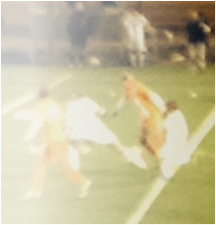
I remember thinking afterwards that the president died because I, a few weeks before my tenth birthday, reached up and unbuttoned my top button and loosened my tie. After all, we prayed from the moment we heard until the end of the school day. Probably no more than an hour, but we knew our prayers weren’t answered when Mrs. Aulisio’s nephew Joe, a sixth grader, ran past the window on the way to his patrol post shouting, “President Kennedy’s dead!” Catholic guilt is a strong potion.
It’s hard to say just when things changed in America. But change they did. From that endless weekend of black-and-white, 24/7 images first from Dallas, and then from Washington, DC, by the end of the twentieth century, says Robert D. Putnam, author of the bestselling book “Bowling Alone,” “Americans…were watching more TV, watching it more habitually, more pervasively, and more often alone, and watching more programs that were associated specifically with civic disengagement.” Unlike that fateful long weekend, today among children 8-18, less than five percent of their TV-watching is done with their parents.
September 11, 2001, is called “The day that never ends.” For those old enough to recall, November 22, 1963, was our September 11, like our parents’ Pearl Harbor-- the day you knew where you were. It was also the end of Camelot. That term is overwrought. Unquestionably there were problems at the start of the 1960s. But perhaps Kennedy’s assassination prepared us in some ways for the explosions that marked the end of the decade.
We did indeed put a man on the moon, in July of 1969, as Kennedy himself had challenged us to do. In an age before computers, cell phones, and total quality management, it is almost inconceivable that we could do that, but not do Obamacare.
We also reeled at the death of Martin Luther King, Jack’s brother Bobby, the Manson Family, Chappaquiddick, My Lai, and the Democratic Convention-turned-to-pandemonium in Chicago.
In 1964, the percentage of Americans who agreed with the statement, “most people can be trusted,” was 77 percent. By 2005, the number had plummeted to 45 percent. In 1965, 36 percent of Americans—more than one in three-- said they’d “like to see their children go into politics as a life’s work.” Today’s under-thirties pay less attention to the news and know less about current events than their elders do today or than people their own age did three decades ago. Oddly, the numbers are worse for college graduates.
But here we are. Jack and Dee are still going strong, if a little more slowly, and we are still doing the best we can. Their children, now eight, still marry and have babies and stay in touch, and…watch their children marry.
On a brilliant day in 1963, the man with the ready, brilliant smile waved his last, and a nation stared in shock, at one another, at the horror, and at the incredible fragility of what we possess. Kennedy concluded his “Moon” speech by saying, “It is heartening to know, as I journey abroad, that our country is united in its commitment to freedom and is ready to do its duty.”
Does the flame still burn? Happy Anniversary, Jack and Dee!




 RSS Feed
RSS Feed